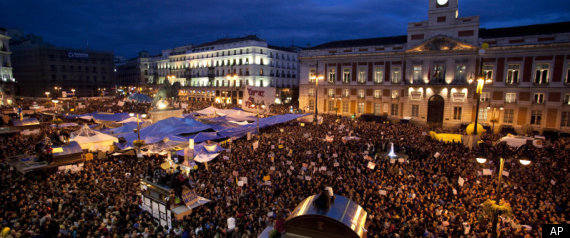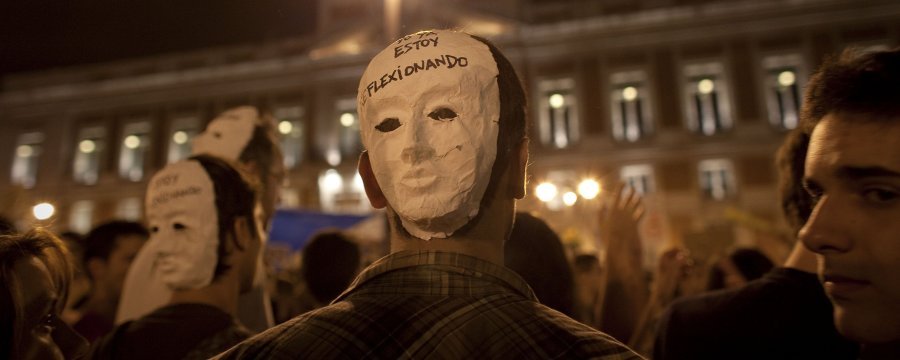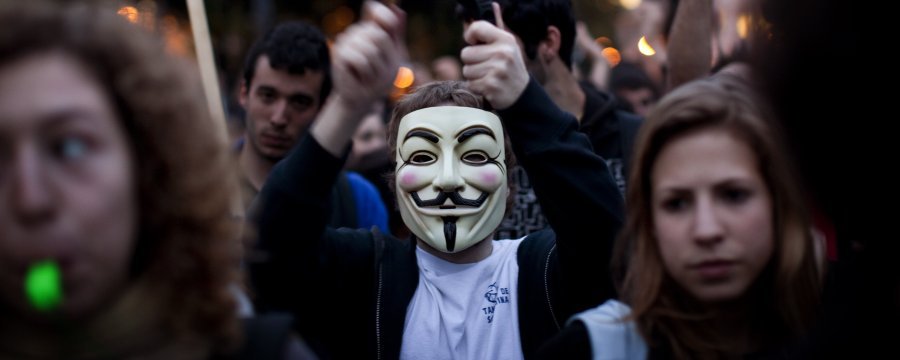TÓM LƯỢC: Vài chục ngàn dân Tây Ban Nha, dưới danh xưng “Những Kẻ Phẫn Nộ” [“los indignados”] tụ họp đông đảo tại nhiều thị trấn lớn trên toàn quốc [Spain] để phản đối nạn thất nghiệp. Chính quyền không giám thi hành lệnh cấm đoán biểu tình, sợ gây phản ứng mạnh. Đa số thành phần nổi dậy thuộc giới trẻ biết sử dụng kỹ thuật liên mạng xã hội [Twitter and social media] qua điện thoại lưu động. Giới tráng niên và các chuyên gia cũng tham gia phong trào để gây áp lực với chính quyền về tình trạng sa sút kinh tế, tài chính trong nước. © www.Vietthuc.org.
MADRID – Tens of thousands of Spaniards angry over joblessness protested for a sixth day on Friday in cities all over the country, and the government looked unlikely to enforce a ban on the demonstrations, fearing clashes.
Dubbed “los indignados” (the indignant), tens of thousands of protesters have filled the main squares of Spain’s cities for six days, in a wave of outrage over economic stagnation and government austerity marking a shift after years of patience.

The electoral board ruled on Thursday that protests would be illegal on Saturday, the eve of elections when Spaniards will choose 8,116 city councils and 13 out of 17 regional governments.
But Prime Minister Jose Luis Rodriguez Zapatero, who has failed to contain the highest unemployment in the European Union, at 21.3 percent, said he may not enforce the ban.
“I have a great respect for the people protesting, which they are doing in a peaceful manner, and I understand it is driven by economic crisis and young people’s hopes for employment,” Zapatero said during a radio interview.
PROTESTERS WILL STAY
“We are not going to budge from here,” said a 44-year-old unemployed man who declined to give his name, during an assembly at Puerta del Sol in central Madrid, where protesters reached an informal consensus to stay in the square despite the ban.
The man was among hundreds who have camped out all week at Puerta del Sol. His wife and daughter join him every day and the crowd swells to thousands every evening. “Our next move is to spread this to the rest of Europe,” he said.
Many protesters told Reuters that they are scared the police will crack down, but analysts said police action against the protesters would be a disaster for the Socialists.
The protesters have called on Spaniards not to vote for the two main parties, the Socialists or the center-right opposition Popular Party.
Spain has struggled to emerge from a recession, and the collapse of the construction sector and a slump in consumer spending have hit the young particularly hard — 45 percent of 18- to 25-year-olds are unemployed.
“They can’t kick us out. The politicians won’t allow it, it’ll make them look bad right before the voting,” said Virginia Braojos, 32, a logistics technician who has come with three friends to the protests every night this week.

NOT A GAME CHANGER
The protests have drawn huge media attention, but will not change the outcome of Sunday’s elections, when the ruling Socialist party is expected to suffer heavy losses over its handling of the economic crisis, a prominent pollster said.
However, the symbolic impact of the protests is huge and will make things even tougher than they already are for the increasingly lame-duck Zapatero, said Jose Juan Toharia, president of Metroscopia pollsters.
“There will be an authentic cataclysm for the Socialists, who are going to head into general elections next year without a single stronghold,” Toharia said.
The next general election is due in March, though some analysts say a Socialist rout could lead to an early election.
The protest movement has captured the mood of many Spaniards who have been out of work for months and face a bleak future as the economy is not yet growing robustly enough to create jobs.
While most protesters are young, organizing themselves through Twitter and social media, middle-aged and older people joined the crowds on Friday, frustrated with stagnation.

STICKING TO DEFICIT COMMITMENT
The risk premium on Spanish debt, as measured by the difference between yields on Spanish and benchmark German bonds, rose on Friday due to concerns that following the elections, new regional leaders will uncover budget shortfalls.
Budget trouble in the regions would rekindle concerns about a fiscal crisis in Spain.
Spain has been under intense market scrutiny since Greece, Ireland and Portugal were forced to accept EU/IMF bailouts.
It is widely accepted that a bailout for Spain, the euro zone’s fourth largest economy, would stretch the European Union’s resources and political will to breaking point.
The Spain/Bund spread traded at its widest since mid-January at around 239 basis points.
Zapatero, who slashed government spending this year, promised there would not be a new round of spending cutbacks following the elections, but stressed Spain’s obligation to international markets to stick to its plan to cut the deficit.
“I can guarantee there will be no more spending cuts after the May 22 elections (but) we are committed to the budget target. I insist we will meet this obligation because, if we don’t, markets and investors won’t finance us, and that would make things worse.”
SOURCE: Tracy Rucinski and Fiona Ortiz
(Additional reporting by Paul Day; editing by Mark Heinrich), REUTERS










































